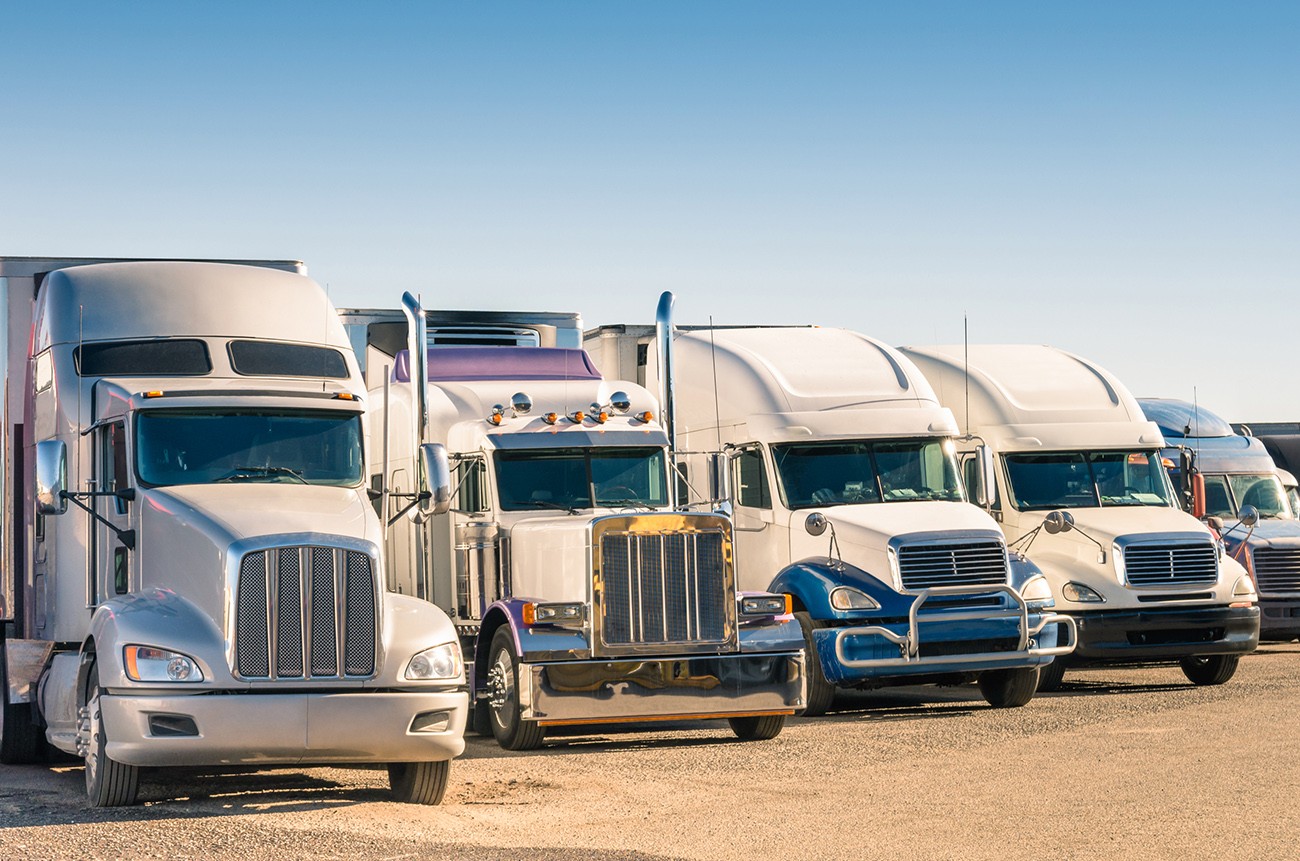
Insights
November 22, 2024
Trump Offers High Reward, High Risk for Trucking Industry, Experts Say.

Insights
November 22, 2024
Trump Offers High Reward, High Risk for Trucking Industry, Experts Say.
An in-depth analysis of how Donald Trump’s regulatory approach could bring both opportunities and challenges for the trucking industry. Experts at FreightWaves’ F3: Future of Freight Festival weigh in on the potential high rewards and risks for trucking industry executives and managers.
Trucking has long been a critical cog in the wheel of America’s economy—worth a staggering $732 billion in annual revenue, according to industry data. At FreightWaves’ F3: Future of Freight Festival, industry experts dissected a timely, contentious topic: What could the trucking industry expect from Trump-era policies? The allure of less regulation certainly excites trucking executives, but a closer examination reveals some significant risks to navigate.
While Donald Trump’s regulatory direction aimed to reduce federal oversight and red tape—a stark contrast to his predecessors—experts caution that deregulation is a double-edged sword. Here’s an in-depth breakdown of the high risks and high rewards for the trucking industry.
The Appeal of Deregulation for Trucking Companies
Trucking companies have long pushed back against government regulations that increase operational costs or introduce more complexity to fleet management. Under Trump’s administration, businesses experienced a wave of deregulation, creating significant potential rewards for the trucking sector.
Here’s why less regulation appeals to trucking firms:
1. Lower Compliance Costs
Regulations often translate into costly compliance measures, such as installing electronic logging devices (ELDs) or adhering to stricter emissions standards. Trump’s administration emphasized scaling back such policies, allowing fleets to save money and direct resources elsewhere.
2. Freedom to Operate
With a lighter regulatory hand, trucking companies can operate more flexibly, adapting quickly to changing market demands. For example, the rollback of greenhouse gas emissions standards eased the pressure on transitioning to costly new technologies and vehicles.
3. Streamlined Operations
Regulatory scrutiny often brings reporting burdens, which can bog down daily operations. Reduced oversight alleviates some of these administrative tasks, freeing up managers and truckers to focus on the business of moving freight, rather than navigating mountains of paperwork.
While these benefits are tangible, trucking executives should beware of potential long-term consequences.
The Risks of Trump-Era “Over-Deregulation”
For every action, there is a reaction. While deregulation may appear to grease the wheels for trucking companies, experts at FreightWaves’ F3 Festival emphasized the hidden risks tied to Trump’s policies.
1. Safety Standards Could Be Eroded
Safety regulations, though sometimes viewed as hindrances, play a critical role in protecting drivers and motorists. Experts worry that cutting corners on policies such as ELD mandates or Hours of Service (HOS) rules could lead to safety lapses, increased accidents, and ultimately higher liability costs for companies.
2. Environmental Pushback
Deregulation often comes at the expense of long-term sustainability. Trucking is a heavily scrutinized industry when it comes to emissions and environmental impact. Rolling back environmental initiatives, as was seen during the Trump administration, could spark resistance from customers and partners increasingly prioritizing green supply chains.
3. Stricter State-Level Regulations
Federal deregulation under Trump often shifted governance back to individual states, paving the way for fragmented state-level regulations. For national carriers operating across state lines, this patchwork system could create greater headaches than a unified federal policy.
4. Economic Volatility and Tariffs
Deregulation alone didn’t paint a full picture of Trump-era policies. Tariff wars and economic unpredictability—hallmarks of Trump’s tenure—were less welcome aspects of his administration for many in the freight industry. Supply chains, already strained by tight margins, may remain wary of similar disruptions ahead.
Key Takeaways from the FreightWaves F3 Panel
The experts at FreightWaves’ F3: Future of Freight Festival brought valuable insights to the table about how trucking executives should approach Trump’s policies. Here are some of the standout points:
* Be Wary of Over-Optimism: While deregulation may appear as a boon, the panel suggested companies weigh short-term gains against potential long-term costs, especially in terms of safety, sustainability, and legal liabilities.
* Monitor Public Sentiment: Consumer and corporate pressure to align with environmental, social, and governance (ESG) initiatives is rising. Trucking companies should take this into account, despite a lighter regulatory landscape.
* Adaptability is Key: Flexible businesses—those that can pivot quickly to policy changes or adjust to market volatility—have the best chance of thriving.
Navigating the Post-Trump Regulatory Landscape
The trucking industry now faces a different regulatory environment with administrations following Trump’s tenure, such as that of President Joe Biden, which focuses on reintroducing many of the rolled-back regulations. Trucking pros monitoring a potential return to Trump-era policies should adopt strategies that strike a healthy balance between seizing short-term opportunities and insulating their companies from risks.
Here’s how:
1. Invest in Safety Technology
Regardless of regulatory relaxation, advanced safety technology like lane departure warnings, driver monitoring systems, and collision avoidance could mitigate risks and maintain safety standards.
2. Maintain ESG Commitments
Even with reduced emissions mandates, companies should consider forging ahead with green initiatives. Electrification, alternative fuels, and fleet efficiency improvements can strengthen customer relationships and future-proof operations against inevitable regulatory shifts.
3. Engage in Advocacy Efforts
Participate in industry associations or advocacy groups to help shape the national conversation. Ensuring your voice is heard in Washington can help influence regulations that balance business interests with industry-wide sustainability and safety.
4. Stay Agile with Technology
Deploy transportation management systems (TMS) and other logistics platforms to pivot nimbly amid new regulations or market conditions. Digital transformation will remain one of the trucking industry’s most vital tools for tackling future uncertainties.
Closing Thoughts
Donald Trump’s approach to trucking industry regulations undeniably brought opportunities for carriers. Lower compliance costs and streamlined operations proved to be attractive. However, as experts at FreightWaves’ F3 Festival emphasized, these high rewards come with equally significant risks—particularly safety concerns, environmental repercussions, and policy fragmentation.
For trucking companies and supply chain executives, the challenge lies in embracing deregulation without abandoning best practices that ensure long-term stability and growth. Balancing risk and reward will require making strategic investments in technology, sustainability, and safety while keeping a close watch on the ever-changing regulatory horizon.
The road ahead for the trucking industry may still be filled with uncertainty, but for those proactively navigating these challenges, the right strategy could pave the way for thriving in any political climate.
Trucking has long been a critical cog in the wheel of America’s economy—worth a staggering $732 billion in annual revenue, according to industry data. At FreightWaves’ F3: Future of Freight Festival, industry experts dissected a timely, contentious topic: What could the trucking industry expect from Trump-era policies? The allure of less regulation certainly excites trucking executives, but a closer examination reveals some significant risks to navigate.
While Donald Trump’s regulatory direction aimed to reduce federal oversight and red tape—a stark contrast to his predecessors—experts caution that deregulation is a double-edged sword. Here’s an in-depth breakdown of the high risks and high rewards for the trucking industry.
The Appeal of Deregulation for Trucking Companies
Trucking companies have long pushed back against government regulations that increase operational costs or introduce more complexity to fleet management. Under Trump’s administration, businesses experienced a wave of deregulation, creating significant potential rewards for the trucking sector.
Here’s why less regulation appeals to trucking firms:
1. Lower Compliance Costs
Regulations often translate into costly compliance measures, such as installing electronic logging devices (ELDs) or adhering to stricter emissions standards. Trump’s administration emphasized scaling back such policies, allowing fleets to save money and direct resources elsewhere.
2. Freedom to Operate
With a lighter regulatory hand, trucking companies can operate more flexibly, adapting quickly to changing market demands. For example, the rollback of greenhouse gas emissions standards eased the pressure on transitioning to costly new technologies and vehicles.
3. Streamlined Operations
Regulatory scrutiny often brings reporting burdens, which can bog down daily operations. Reduced oversight alleviates some of these administrative tasks, freeing up managers and truckers to focus on the business of moving freight, rather than navigating mountains of paperwork.
While these benefits are tangible, trucking executives should beware of potential long-term consequences.
The Risks of Trump-Era “Over-Deregulation”
For every action, there is a reaction. While deregulation may appear to grease the wheels for trucking companies, experts at FreightWaves’ F3 Festival emphasized the hidden risks tied to Trump’s policies.
1. Safety Standards Could Be Eroded
Safety regulations, though sometimes viewed as hindrances, play a critical role in protecting drivers and motorists. Experts worry that cutting corners on policies such as ELD mandates or Hours of Service (HOS) rules could lead to safety lapses, increased accidents, and ultimately higher liability costs for companies.
2. Environmental Pushback
Deregulation often comes at the expense of long-term sustainability. Trucking is a heavily scrutinized industry when it comes to emissions and environmental impact. Rolling back environmental initiatives, as was seen during the Trump administration, could spark resistance from customers and partners increasingly prioritizing green supply chains.
3. Stricter State-Level Regulations
Federal deregulation under Trump often shifted governance back to individual states, paving the way for fragmented state-level regulations. For national carriers operating across state lines, this patchwork system could create greater headaches than a unified federal policy.
4. Economic Volatility and Tariffs
Deregulation alone didn’t paint a full picture of Trump-era policies. Tariff wars and economic unpredictability—hallmarks of Trump’s tenure—were less welcome aspects of his administration for many in the freight industry. Supply chains, already strained by tight margins, may remain wary of similar disruptions ahead.
Key Takeaways from the FreightWaves F3 Panel
The experts at FreightWaves’ F3: Future of Freight Festival brought valuable insights to the table about how trucking executives should approach Trump’s policies. Here are some of the standout points:
* Be Wary of Over-Optimism: While deregulation may appear as a boon, the panel suggested companies weigh short-term gains against potential long-term costs, especially in terms of safety, sustainability, and legal liabilities.
* Monitor Public Sentiment: Consumer and corporate pressure to align with environmental, social, and governance (ESG) initiatives is rising. Trucking companies should take this into account, despite a lighter regulatory landscape.
* Adaptability is Key: Flexible businesses—those that can pivot quickly to policy changes or adjust to market volatility—have the best chance of thriving.
Navigating the Post-Trump Regulatory Landscape
The trucking industry now faces a different regulatory environment with administrations following Trump’s tenure, such as that of President Joe Biden, which focuses on reintroducing many of the rolled-back regulations. Trucking pros monitoring a potential return to Trump-era policies should adopt strategies that strike a healthy balance between seizing short-term opportunities and insulating their companies from risks.
Here’s how:
1. Invest in Safety Technology
Regardless of regulatory relaxation, advanced safety technology like lane departure warnings, driver monitoring systems, and collision avoidance could mitigate risks and maintain safety standards.
2. Maintain ESG Commitments
Even with reduced emissions mandates, companies should consider forging ahead with green initiatives. Electrification, alternative fuels, and fleet efficiency improvements can strengthen customer relationships and future-proof operations against inevitable regulatory shifts.
3. Engage in Advocacy Efforts
Participate in industry associations or advocacy groups to help shape the national conversation. Ensuring your voice is heard in Washington can help influence regulations that balance business interests with industry-wide sustainability and safety.
4. Stay Agile with Technology
Deploy transportation management systems (TMS) and other logistics platforms to pivot nimbly amid new regulations or market conditions. Digital transformation will remain one of the trucking industry’s most vital tools for tackling future uncertainties.
Closing Thoughts
Donald Trump’s approach to trucking industry regulations undeniably brought opportunities for carriers. Lower compliance costs and streamlined operations proved to be attractive. However, as experts at FreightWaves’ F3 Festival emphasized, these high rewards come with equally significant risks—particularly safety concerns, environmental repercussions, and policy fragmentation.
For trucking companies and supply chain executives, the challenge lies in embracing deregulation without abandoning best practices that ensure long-term stability and growth. Balancing risk and reward will require making strategic investments in technology, sustainability, and safety while keeping a close watch on the ever-changing regulatory horizon.
The road ahead for the trucking industry may still be filled with uncertainty, but for those proactively navigating these challenges, the right strategy could pave the way for thriving in any political climate.
An in-depth analysis of how Donald Trump’s regulatory approach could bring both opportunities and challenges for the trucking industry. Experts at FreightWaves’ F3: Future of Freight Festival weigh in on the potential high rewards and risks for trucking industry executives and managers.
Trucking has long been a critical cog in the wheel of America’s economy—worth a staggering $732 billion in annual revenue, according to industry data. At FreightWaves’ F3: Future of Freight Festival, industry experts dissected a timely, contentious topic: What could the trucking industry expect from Trump-era policies? The allure of less regulation certainly excites trucking executives, but a closer examination reveals some significant risks to navigate.
While Donald Trump’s regulatory direction aimed to reduce federal oversight and red tape—a stark contrast to his predecessors—experts caution that deregulation is a double-edged sword. Here’s an in-depth breakdown of the high risks and high rewards for the trucking industry.
The Appeal of Deregulation for Trucking Companies
Trucking companies have long pushed back against government regulations that increase operational costs or introduce more complexity to fleet management. Under Trump’s administration, businesses experienced a wave of deregulation, creating significant potential rewards for the trucking sector.
Here’s why less regulation appeals to trucking firms:
1. Lower Compliance Costs
Regulations often translate into costly compliance measures, such as installing electronic logging devices (ELDs) or adhering to stricter emissions standards. Trump’s administration emphasized scaling back such policies, allowing fleets to save money and direct resources elsewhere.
2. Freedom to Operate
With a lighter regulatory hand, trucking companies can operate more flexibly, adapting quickly to changing market demands. For example, the rollback of greenhouse gas emissions standards eased the pressure on transitioning to costly new technologies and vehicles.
3. Streamlined Operations
Regulatory scrutiny often brings reporting burdens, which can bog down daily operations. Reduced oversight alleviates some of these administrative tasks, freeing up managers and truckers to focus on the business of moving freight, rather than navigating mountains of paperwork.
While these benefits are tangible, trucking executives should beware of potential long-term consequences.
The Risks of Trump-Era “Over-Deregulation”
For every action, there is a reaction. While deregulation may appear to grease the wheels for trucking companies, experts at FreightWaves’ F3 Festival emphasized the hidden risks tied to Trump’s policies.
1. Safety Standards Could Be Eroded
Safety regulations, though sometimes viewed as hindrances, play a critical role in protecting drivers and motorists. Experts worry that cutting corners on policies such as ELD mandates or Hours of Service (HOS) rules could lead to safety lapses, increased accidents, and ultimately higher liability costs for companies.
2. Environmental Pushback
Deregulation often comes at the expense of long-term sustainability. Trucking is a heavily scrutinized industry when it comes to emissions and environmental impact. Rolling back environmental initiatives, as was seen during the Trump administration, could spark resistance from customers and partners increasingly prioritizing green supply chains.
3. Stricter State-Level Regulations
Federal deregulation under Trump often shifted governance back to individual states, paving the way for fragmented state-level regulations. For national carriers operating across state lines, this patchwork system could create greater headaches than a unified federal policy.
4. Economic Volatility and Tariffs
Deregulation alone didn’t paint a full picture of Trump-era policies. Tariff wars and economic unpredictability—hallmarks of Trump’s tenure—were less welcome aspects of his administration for many in the freight industry. Supply chains, already strained by tight margins, may remain wary of similar disruptions ahead.
Key Takeaways from the FreightWaves F3 Panel
The experts at FreightWaves’ F3: Future of Freight Festival brought valuable insights to the table about how trucking executives should approach Trump’s policies. Here are some of the standout points:
* Be Wary of Over-Optimism: While deregulation may appear as a boon, the panel suggested companies weigh short-term gains against potential long-term costs, especially in terms of safety, sustainability, and legal liabilities.
* Monitor Public Sentiment: Consumer and corporate pressure to align with environmental, social, and governance (ESG) initiatives is rising. Trucking companies should take this into account, despite a lighter regulatory landscape.
* Adaptability is Key: Flexible businesses—those that can pivot quickly to policy changes or adjust to market volatility—have the best chance of thriving.
Navigating the Post-Trump Regulatory Landscape
The trucking industry now faces a different regulatory environment with administrations following Trump’s tenure, such as that of President Joe Biden, which focuses on reintroducing many of the rolled-back regulations. Trucking pros monitoring a potential return to Trump-era policies should adopt strategies that strike a healthy balance between seizing short-term opportunities and insulating their companies from risks.
Here’s how:
1. Invest in Safety Technology
Regardless of regulatory relaxation, advanced safety technology like lane departure warnings, driver monitoring systems, and collision avoidance could mitigate risks and maintain safety standards.
2. Maintain ESG Commitments
Even with reduced emissions mandates, companies should consider forging ahead with green initiatives. Electrification, alternative fuels, and fleet efficiency improvements can strengthen customer relationships and future-proof operations against inevitable regulatory shifts.
3. Engage in Advocacy Efforts
Participate in industry associations or advocacy groups to help shape the national conversation. Ensuring your voice is heard in Washington can help influence regulations that balance business interests with industry-wide sustainability and safety.
4. Stay Agile with Technology
Deploy transportation management systems (TMS) and other logistics platforms to pivot nimbly amid new regulations or market conditions. Digital transformation will remain one of the trucking industry’s most vital tools for tackling future uncertainties.
Closing Thoughts
Donald Trump’s approach to trucking industry regulations undeniably brought opportunities for carriers. Lower compliance costs and streamlined operations proved to be attractive. However, as experts at FreightWaves’ F3 Festival emphasized, these high rewards come with equally significant risks—particularly safety concerns, environmental repercussions, and policy fragmentation.
For trucking companies and supply chain executives, the challenge lies in embracing deregulation without abandoning best practices that ensure long-term stability and growth. Balancing risk and reward will require making strategic investments in technology, sustainability, and safety while keeping a close watch on the ever-changing regulatory horizon.
The road ahead for the trucking industry may still be filled with uncertainty, but for those proactively navigating these challenges, the right strategy could pave the way for thriving in any political climate.
Other Blogs
Other Blogs
Check our other project Blogs with useful insight and information for your businesses
Other Blogs
Other Blogs
Check our other project Blogs with useful insight and information for your businesses
Other Blogs
Other Blogs
Check our other project Blogs with useful insight and information for your businesses


